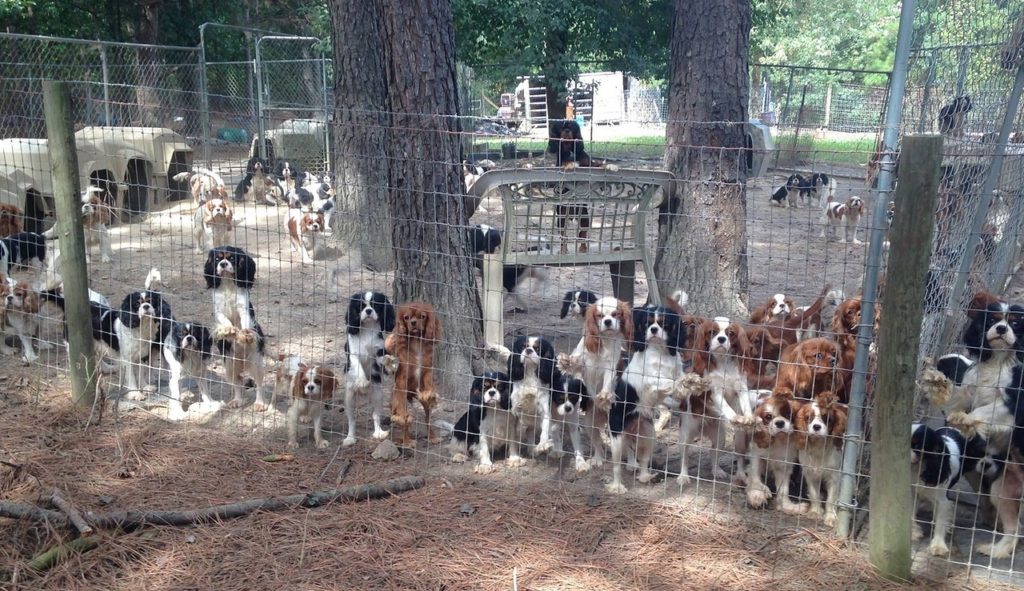
Trump Administration proposes new rules to stop some puppy mill abuses
USDA has been lax on enforcement, but these steps can help shield dogs from mistreatment
- Holly Gann
Puppy mills have been an American curse, but this week, we are wagging our tails a bit at the thought of some federal reforms. The U.S. Department of Agriculture (USDA) just announced a proposed rule to address bad behavior from licensed commercial dog breeders and other animal exhibitors regulated under the Animal Welfare Act.
Mother dogs typically have it the worst at the mills, bred every heat cycle, denied veterinary care, kept in extreme confinement, and often exposed to the elements. Stronger standards are needed, but aggressive enforcement of the minimal standards is also essential. While the proposed rule is far from comprehensive in addressing the wide range of problems with puppy mills, these proposed new policies are meaningful steps to help dogs. It’s been a long time coming, and we are grateful to USDA for starting down this important path.
The proposed rule includes key provisions contained within two bills in Congress, led by Reps. Brian Fitzpatrick (R-PA) and Charlie Crist (D-FL). The Welfare Of Our Friends (WOOF) Act, H.R. 1002, which was reintroduced earlier this year, and the Puppy Protection Act, soon to be introduced by the same pair of lawmakers, crack down on puppy mills and create improved housing and living standards for dogs. Fitzpatrick and Crist are great champions of animal protection and they are showing the way.
The proposed USDA rule will prevent licensees who have had their licenses revoked from getting their licenses automatically renewed. Just because you once got a license doesn’t mean you deserve it indefinitely. Indeed, that’s the point of the USDA inspections program. If that program finds that the breeder isn’t providing proper care, that individual should not be automatically renewed.
The rule also prevents a de-licensed dog breeder from continuing to operate by simply putting the dog breeding operation under the name of a family member. We’ve seen this shell game at work, and it’s just a dishonest and fraudulent way of doing business. Bad actors get around USDA by gaming the system, and the rule prevents this kind of chicanery.
Also, before issuing a license, an applicant would be required to disclose animal cruelty convictions and pass an inspection that demonstrates they are in compliance with the Animal Welfare Act. The rule further proposes certain welfare requirements for dogs, including continuous access to clean water and a veterinary plan that includes vaccinations and an annual exam for each dog.
The rule also applies to exhibitors of other animals, such as captive wildlife. USDA states the agency is seeking to prevent individuals from obtaining federal licenses as a way to simply get around state laws that restrict possession of these animals.
Until May 21, the USDA is accepting comments from the public on this issue. We hope you’ll take action here and speak up in support of stronger regulations and urge USDA to include additional commonsense requirements for dogs in puppy mills, such as those put forth in the Puppy Protection Act, including increased space, access to the outdoors, socialization, and limits on the number of times a mother dog can be bred.
Additionally, we need your help in urging USDA to aggressively enforce the Animal Welfare Act to better protect dogs in puppy mills and wild animals kept by exhibitors. USDA has a long, documented track record of inadequate enforcement that has allowed animals to live in squalor, extreme cold or heat, and other uncomfortable and at times life-threatening situations. Sadly, we’ve referred to the standards on mills as survival standards, rather than humane treatment protections. The agency has too often not imposed meaningful penalties on licensed breeders who just can’t or won’t get it right when it comes to basic care.
To learn the truth of what’s happening to dogs, USDA should conduct unannounced inspections and not let people with a history of flouting the law continue to breed and sell dogs commercially.
After you leave a comment, take additional action to help dogs in puppy mills by contacting your U.S. Representative and urging co-sponsorship of the WOOF Act and Puppy Protection Act. USDA obviously took note of the gathering momentum for this legislation in Congress, and we need to keep the heat on the agency to act. Continuing Congressional attention on this issue is the key to a long-term solution.
Holly Gann is the director of federal affairs at Animal Wellness Action and the Animal Wellness Foundation